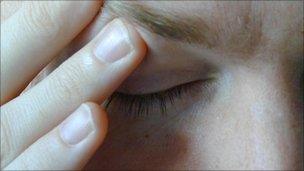Botox approved for the prevention of chronic migraine
- Published

Chronic migraines can dramatically impair quality of life
Botox has been approved as a preventive treatment for chronic migraine by UK drug regulators.
It comes after a trial of more than 1,300 patients showed success in reducing the frequency of headaches.
But only patients who suffer headaches for at least 15 days a month, half of which come with migraine symptoms, are eligible, the Medicines and Healthcare Products Regulatory Agency said.
It is thought around 700,000 people in the UK get chronic migraines.
Migraine charities said many of those would not have been properly diagnosed and that some patients can really struggle to find a treatment that works.
Injections of botox, or botulinum toxin, are more commonly associated with smoothing out wrinkles.
It is not exactly clear why it may work in chronic migraines but it is thought that, as well as being a muscle relaxant, it may work to block pain signals.
In clinical trials, patients were given up to five courses of injections of botox into specific head and neck muscles every 12 weeks.
After 24 weeks, those treated with Botox had fewer days with a migraine than those who received a placebo injection.
By one year, nearly 70% of those treated with Botox had a 50% reduction in the number of migraines compared with before the trial.
The final results were published in Headache, external in May this year.
Prevention not cure
Lee Tomkins, director of Migraine Action, stressed it was not a "cure" but offered hope for those who suffer the most frequent migraines.
"We have been following these studies really closely and the evidence is really pretty solid.
"These people spend half their lives in pain.
"Even if they get half the attacks, it can really improve their quality of life."
She advised people to speak to their GP to find out if the treatment might be suitable for them and whether they should be referred to a neurologist who could carry out the injections.
And she recommended keeping a diary of symptoms to help doctors diagnose the problem.
Wendy Thomas, chief executive of The Migraine Trust, added: "We know that treatment with acute pain medication does not always work for these patients so we welcome new therapies, especially preventative medication, for this potentially disabling condition."